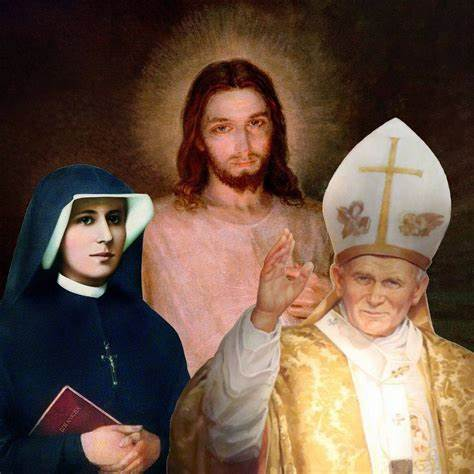The Mandate for Forgiveness
Meditation
for Second Sunday of Easter
(Feast
of Divine Mercy)
(Acts
5:12-16; Rev 1:9-11, 12-13, 17-19; Jn 20:19-31)
On this second Sunday of Easter, the Church celebrates the
mercy of God. In our meditation, we gaze upon the disciples as they gathered behind
closed doors. A thick wall of fear held them enclosed in the room, and a cloud
of uncertainty and confusion hovered over them. It appears they found a place
of refuge for themselves, a comfort measure against the malice and hatred of
the Jews. At this point, fear exalted the enemies of Jesus, while His friends
were silenced and enclosed behind bolted doors.
While under the grip of fear, the disciples did not set
their will, mind and heart on the terror of the malice of the Jews and the elders,
but on the events surrounding Jesus. The contemplation of their hearts was on
their Master, and about the news of His resurrection, its meaning and
implication for them. “For where your heart is, there will your heart be also”
(Mt 6:21).
Suddenly, Jesus appeared in their midst! His presence
stripped the enclosing walls and doors of their relevance, and fear lost its
grip. The disciples were drawn to silence and wonder. Their hovering minds and
confusion of heart now had a focal point. The thick cloud of confusion melted
away as they gazed upon Jesus, in whom is the answer to all their questionings
and doubts. His presence spoke in silence what His voice was about to declare: “Peace
be with you.”
Peace is the most important ingredient man needs for a
wholesome and fulfilled life. ‘Peace’ is not a just a product of human efforts
and deliberations. It is, majorly, a gift of resurrection.
Then Jesus gave them the mandate to go and preach the good
news. He breathed on them, and said, “Receive the Holy Spirit. If you forgive
the sins of any, they are forgiven; if you retain the sins of any, they are
retained.” Meditate on this mandate to forgive sins and see its immediate and
living link with the Eucharistic mandate, “Do this in memory of me.” The forgiveness
poured out in the Eucharist is now instituted and given its own mandate! Hence,
the Sacrament of Reconciliation has a special connection with the Sacrament of
the Eucharist.
Mercy as a sacrament becomes a necessary means of salvation,
and an object of faith. Thus, in the creed we the Church professes, “I believe
in the forgiveness of sins.” And the preaching of the gospel includes an
invitation to participate in God’s forgiveness and the Eucharistic nourishment.
So, the ocean of Divine Mercy gushed forth from the pierced
side of Jesus as water and blood flowed down. As Jesus appeared to the disciples
behind closed doors, so does the mercy of God pierce through the walls of sin
and hate to set us free for God and for our neighbor. We see this in the
example of Peter when he denied Jesus, but the merciful gaze of Jesus broke
through the walls of his fear and ego. The parable of the prodigal son
demonstrates it too. It is still this mercy that passed through the walls of
Thomas’ doubts and brought him to faith and homage.
This mercy that Jesus instituted as a Sacrament was later
revealed to Sr Faustina on Feb 22 1931 as a devotion. And John Paul II on May 5th,
2000 declared the second Sunday of Easter as Divine Mercy Sunday in accordance
with the request of our Lord through Sr Faustina. Divine Mercy as a devotion draws
us to contemplation, envelops our hearts, mind and will. It becomes an exercise
of faith in which we re-echo the homage of St Thomas, “My Lord and my God!” The
Lord wants the ocean of His mercy, the unfathomable divine mercy, to envelop
the whole world and gush forth for us. As mercy is the greatest attribute of God,
so it has become our identity and should manifest in every aspect of our lives.
We who have been found out by God’s mercy, saved by His mercy, set free and
nourished by His mercy, will go forth to show mercy and preach the gospel of God’s
mercy. Amem.
Fr Jude Chinwenwa Nwachukwu, C.Ss.R
Saints Peter & Paul Catholic Church,
Tedi-Muwo, Lagos.
Sunday April 24th, 2022.

Very wonderful sermon Fr.
ReplyDelete